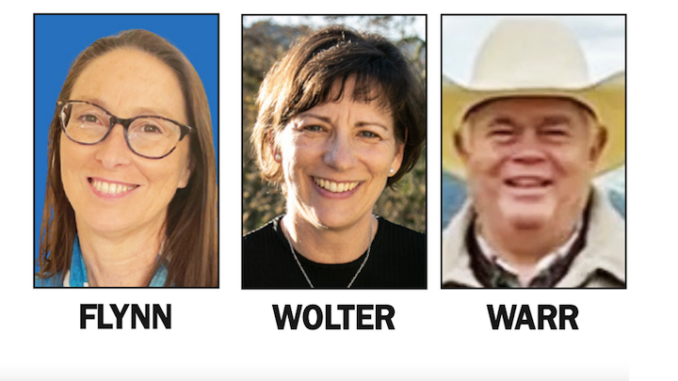
Editor’s note: This story has been corrected to accurately state Helen Wolter’s opinion of financing options.
BY AMELIA BISCARDI
Daily Post Staff Writer
Portola Valley Town Council will have a number of fresh faces to tackle the town’s issues including the government’s financial crisis, hiring a new town manager and meeting state-imposed housing requirements.
Mayor Sarah Wernikoff and Councilman Jeff Aalfs aren’t running for re-election, opening up two seats. Candidates Rebecca Flynn, Carter Warr, Helen Wolter and Ellen Vernazza are looking to replace them.
Rebecca Flynn, 59, runs the PVForum, an online email group for residents. She says she takes a “data-driven” approach, which would benefit the council.
Her main goal is to protect open spaces while utilizing buildable spaces for affordable housing.
Flynn, a digital ad consultant, is a commissioner on the Architectural and Site Control Commission.
She says many spaces in town aren’t buildable due to fire hazards or landsite hazards and sees a need to build affordable housing.
“Portola Valley used to be a community of middle-class people and working people,” Flynn said. “With the cost of building and the cost of land, it’s becoming a community of millionaires and even multi-millionaires.”
The town is facing the possibility that it will go broke in 2028, and is looking for ways to cut costs and bring in more money.
Flynn said she is glad the town was able to cut costs. She said the current council didn’t move fast enough to avert the crisis, and the next two years will be crucial for the town’s finances.
Taxes may be the only wan to ensure that the town’s services are sufficient. She favors the proposed real estate transfer tax because it only affects people selling their homes.
Council is considering combining services, such as its policing contract with the sheriff’s office, with Woodside. Flynn is OK with that idea but is concerned Woodside wouldn’t be interested.
Architect Carter Warr, 63, said his job balances clients’ needs and wants. He said that skill will be helpful for council.
He’s the chair of the Architectural and Site Control Commission and he wants to bring the town council and residents together.
His main priority is maintaining open space, especially maintaining trail access.
“Most of the stuff we don’t agree on is pretty minor,” Warr said. “If we understand why each side feels the way they do, we could sort out the real important parts so that we can help make decisions that most people agree on.”
Warr wants to reduce the town manager’s power and recruit volunteers to reduce costs.
Warr says consultants who bring plans before the town don’t have enough experience in rural communities and they reuse projects. If elected, Warr wants to be careful with spending on consultants.
“I don’t think the town should even build any housing,” Warr said. “I don’t think the town is ever going to have the money to actually do it.”
Warr wants to have retailers in town, but tailored to the natural landscape of Portola Valley. He imagines a dance studio, a tutoring company, retail and restaurants.
Warr’s plan is to be careful with spending, then bring up staffing, increase pay and empower them to tackle more responsibilities.
While Warr believes the town could work with Woodside to share services, he is cautious as the towns have different management styles and Woodside has less open space.
Helen Wolter grew up in Portola Valley and doesn’t feel like the current council represents all viewpoints. Wolter, 55, works as a senior management analyst for the city of Half Moon Bay and says her priority is focusing on the town’s finances.
Wolter says the main areas of financial concern are the “trifecta” of the sheriff’s office contract, the town’s planning and the lawyer’s contract. Wolter says the town council negotiated the contract with the sheriff’s office, but this past cycle they signed it as is. She wants to see if the town can negotiate the contract and consider combining the services with another town.
Wolter says if elected she would work to build trust with the community and staff, “this is an uphill situation,” and is confident her experience will make things easier.
While the town has a hiring freeze, Wolter wants to focus on hiring the positions allowed and retaining employees. While she supports combining services, she doesn’t believe combining the towns completely is a realistic plan, but if at the time it is the best option, she will support it.
She says sharing services would require creation of a joint powers authority, which can work well but can also be contentious.
She wants to investigate a financing option called “lease leaseback,” in which the county would lease town property and pay the town rent. But at the end of the lease, say 3 to 5 years, the town would have to pay the county back plus 2% interest.
Ellen Vernazza, 72, is a retired real estate agent. Vernazza did not respond to the Post’s request for an interview.
